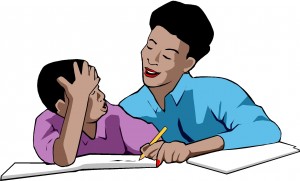Language-Based Learning Difficulties
What is a learning disability?
 A learning disability is a neurological disorder that affects the brain’s ability to receive, process, store and respond to information. The term learning disability is used to describe the seemingly unexplained difficulty a person of at least average intelligence has in acquiring basic academic skills.
A learning disability is a neurological disorder that affects the brain’s ability to receive, process, store and respond to information. The term learning disability is used to describe the seemingly unexplained difficulty a person of at least average intelligence has in acquiring basic academic skills.
Many learning difficulties are language-based. In our school system, most information is taught via language – listening, speaking, reading and writing – so it is not surprising that otherwise intelligent students with language impairments fail to succeed. See below for some language development milestones.
What are some symptoms of language-based learning difficulties?
Your child may be experiencing language-based difficulties if they have trouble:
| SPEAKING | WRITING |
|---|---|
|
|
|
|
|
|
|
|
| UNDERSTANDING | READING |
|---|---|
|
|
|
|
|
|
|
|
How can a speech-language pathologist help?
Speech-language pathologists have a unique knowledge base of how cognition interacts with language. Speech-language pathologists help build core and compensatory language skills so that students won’t need to rely on tutors for all their work in the future.
Is there anything I can try myself?
Language-based learning difficulties tend to be complex to remediate, so it is best to obtain professional guidance.
| What language skills should you expect? | |
|---|---|
| By Age 5 |
|
| Age 5-7 |
|
| Age 7-9 |
|
| Age 9-12 |
|
| Age 12-18 |
|
